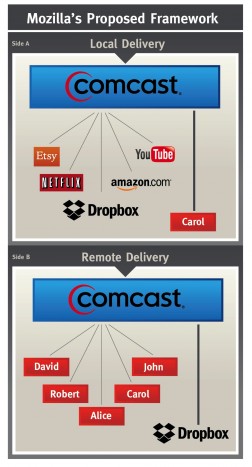By Chris Riley
Mozilla‘s official blog on open Internet policy initiatives and developments
In January, the DC Circuit Court of Appeals struck down a Federal Communications Commission (FCC) order that prevented Internet Service Providers (ISPs) from blocking and discriminating against edge providers, including any website operator, application developer or cloud service provider. We called the court’s ruling “alarming for all Internet users.” As Mozilla Chairwoman Mitchell Baker and then-CEO John Lilly put it in 2009: “Nondiscriminatory access to content is what created the miracle of the Internet. It must be preserved.”
Today, Mozilla formally filed a request with the FCC to take a new path forward. We are asking the FCC to modernize its understanding of Internet access services, and apply its statutory authority for Internet data delivery services in a consistent and complete way. With our proposal, the FCC would be able to shift its attention away from authority questions once and for all, and focus instead on adopting clear rules prohibiting blocking and discrimination online.
The FCC is currently planning to propose new rules that would allow ISPs to charge edge providers for prioritized access over others. Open Internet advocates and media have been very critical of the agency’s strategy. We, too, are concerned that the FCC’s approach would not adequately safeguard the open Internet. Innovation and competition require nondiscriminatory access for all edge providers to end user subscribers, without blocking, throttling, or prioritizing one option relative to others.
Even if the FCC’s current plan is adopted and survives court review, and even if Chairman Wheeler stands ready to use the FCC’s full authority to establish stronger protections later, should they become needed, Internet users and developers cannot know whether future FCC Chairs will maintain vigilance. In contrast, clear authority and meaningful, enforceable rules would provide lasting certainty.
One of the biggest obstacles to overcome is authority, and how to get past limitations put into law several years ago. Our petition tackles this challenge head-on:
|
Categorizing remote delivery services as telecommunications services is consistent with the guidelines set by both Congress and the DC Circuit Court of Appeals, and would give the FCC ample ability to adopt and enforce meaningful net neutrality. With clear authority and effective rules, ISPs would be prevented from blocking or discriminating against any edge provider, whether on a wireline or wireless network.
The path we propose is grounded in a modern understanding of technology and markets, and drawn from the perspective of Silicon Valley, where so many of the Internet’s inventions have originated. Mozilla’s proposal would help ensure that the Internet continues to be an innovative and open platform, central to our individual growth and our collective future.
We plan to continue working with policymakers and thought leaders on Internet policy to develop and advance these ideas over the next few weeks. We expect there will be ample opportunity for public comment on our idea, among others, and we encourage everyone to join in the conversation. Stay tuned to this blog, and to the Wiki page we’ve put up on this issue, to learn more and to find ways to get involved.
May 6 Update: Based on the input we’ve received about this proposal since announcing it, we felt it would be useful to clarify a few things that seem to cause some sporadic confusion:
- Our petition asks the FCC to use Title II, but it isn’t reclassification, because it wouldn’t reverse existing precedents.
- We are not asking the FCC to apply Title II to peering and interconnection, only last mile remote delivery services.
- Our petition would not impose obligations on technology companies, but instead would safeguard them by clearly delineating services.










